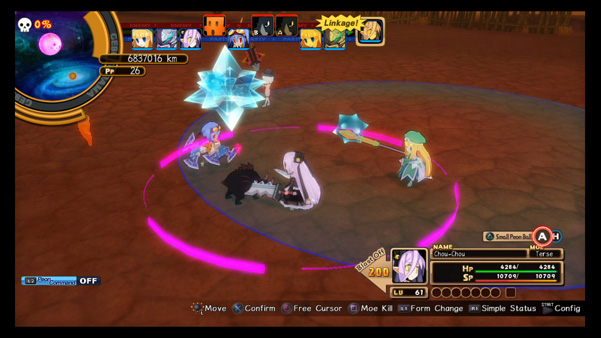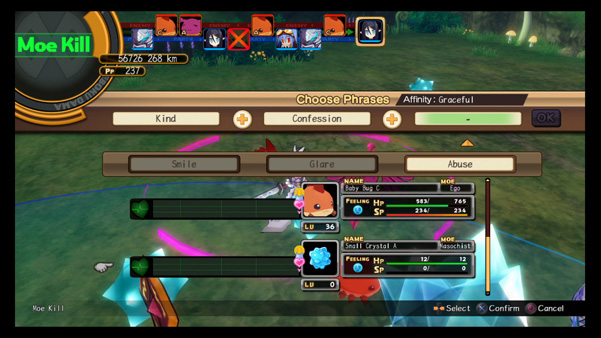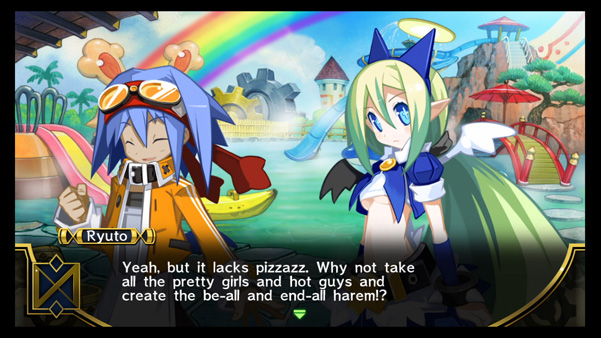Compile Heart and NIS America are at it once again: bringing a fille-filled JRPG to the Playstation 3 and the West. Mugen Souls seeks to subjugate everyone and everything—a fair enough conqueror at the very least.
Mugen Souls begins with an introduction to the egotistical protagonist, Chou-Chou, self-proclaimed undisputed god of the universe. Charged with the goal of charming the seven planets that have caught her eye into servitude, you embark upon your journey. As I stepped into her shoes, I quickly found myself beset by several monstrous beasts. But not the fiends one would expect from a role-playing game. Those would have been preferred. Instead, I’m met with tiresome baddies incapable of outright sublimation.
There’s the obnoxious, cloying and obnoxiously cloying attempts at slapstick or sex humor; the latter of which I’ve an admitted proclivity for. To say the nosebleeds and hehe-she-has-breasts humor gets old would be true if it were ever funny. And it really piles on. Speaking of needless and situation-oblivious slapstick, there’s an exclamation point that appears above the head of characters when their attention is grabbed by something especially jarring. This would be all well and good if the accompanying sound wasn’t something pulled from a Three Stooges movie. It’s hard to look at the serious moments with anything but disdain when an exclamation expression rears its boingy head mid-stride.
Nonetheless, I swallow that pill and proceed with the purpose of my peregrination, making worlds my peons. To do so, I must confront and court the worlds’ heroes and demon lords. Romancing them—actually, romancing is a very misleading word. Befriending them, then, is achieved principally through advancing the story. The real need for romance is called for in subjugating foes in battle and while exploring worlds. As an undisputed god, the player will go as far as wielding their wiles to make entire continents swoon. Only everything has its tastes, even continental plates. To contend with varying jollies, Chou-Chou has the ability to switch forms and personalities; Masochist, sadist, ditz, hyper, terse, bipolar, graceful and ego number her available approaches to “Moe Killing” an opponent. Instead of explaining the meaning of moe here, just view it this way: she’s making something into her peon by getting it off.
This works quite well in areas where you’re romancing continents. Not so much in battle. There’s an esoteric system at play that has you trying to Moe Kill enemies with an onslaught of (not really) filthy girl love. You might flash them a smile, cast askance shyly, bay like a dying goat or confess your adoration—there are manifold options, really. The trouble here is twofold.
The options for cosseting fetishes appear to have no rhyme or reason. They do. I’ve seen charts online that explain it. Without the charts, however, you’re oftentimes not going to know what to do or say, Casanova or not.
Second, and perhaps more importantly, the Moe Kill system is separate of combat. You’re in the same screen, on the battlefield, but using the Moe Kill does not kill an enemy in the same way. That would be fine were it not for the inefficiency of Moe Kills. It is far, far quicker to simply run your foes through. Further, only Chou-Chou can perform Moe Kills, so you’ll have your other combatants standing around with scrabbling fingers when their turn arrives. I found myself outright ignoring the Moe Kill system for most of the game (except where it was necessary to romance continents). Were there not such a chasm between Moe Kills and combat, were it not limited to Chou-Chou, it would be a great twist on the typical turn-based battle system otherwise employed. There should have been a marriage of ideas, not a separation.
Perhaps I could have looked over the crawl of Moe Killing had it not affected me so profoundly later on. Using Moe Kills to court enemies results in a mighty impact on your, well, everything. One particular case is the starship battles: rock-paper-scissor affairs that you’ll occasionally encounter. My ship was a runt, a powerless little thing. Most of my ship battles involved using the HP Absorb and Reflect skills to only just—sometimes not at all—get by. But hey, I managed to use what options I had to tackle obstacles and it worked, so I can’t carp over that too much.
I can, however, censure the sometimes optional sometimes obligatory grinding. Let’s start with the requisite—get the nasty out of the way first. There comes a point when you have to romance a continent to advance the story. Cool. That’s chirpsy-daisy and tickety-boo. I’d done it before no problem. This time you’re only given a small number of points that must be courted before advancing. The problem lies in how they must be courted. There are three ways of courting a continent depending on which points you approach: Moe Kills, cash money and by the number of monsters you have killed. Unfortunately, one of these story-related points required I kill a great deal of monsters. Almost twice as many as I had killed at that point. This was no paltry amount. I hadn’t avoided monsters. I’d even beaten fifty levels of the Mugen Field, an “optional” area at your hub ship that works like a gauntlet. Yet I needed to kill 500 monsters to advance the story. I quit playing, and I considered stopping there and writing an incensed review. I am somewhat stubborn, so I eventually invested the hours necessary to get the kills I needed. Still, I mark obligatory grinding to advance a plot as a shining beacon of Compile Heart’s running love story with poor game design.
Then there’s the optional grinding. I like that Mugen Souls gives players with a predilection toward monotonousness the option to pursue that fondness. For those players, there is a wealth of post-game content. For players like me with no favorable disposition toward boredom, I found myself irked. There’s an option to create custom characters, so I thought it’d be neat to create a few of my own. Throw some personal charm into the mix. Those characters were nigh useless. And if I wanted to change their job class, I’d be forced to start at level one. Job classes are only unlocked with Mugen Points by advancing in, you guessed it, the Mugen Field. Yeah! So naturally I didn’t have the option to make these classes at the beginning of the game. Instead, I progressed with two characters that would have been dead weight were it not for their leveled weapons and gear.
An irksome element of combat I’ve forgotten to mention—likely due to my brain blocking the inane concept from memory—is the peon ball. It’s an omnipresent part of the battle interface, seething in the top left with some vile percentage that tells you your chances of it blowing up in your face on Chou-Chou’s next turn. If it doesn’t explode, you’ll do decent damage or healing depending on what you choose. That in itself isn’t an issue. However, there’s a chance it will go critical and explode, killing everyone. A chance. A chance of wiping your entire party for using the main character (who happens to be the only high-damage character I have). Thus far, it has prevented me from defeating the final boss four times. Chalk another one up for Compile Heart’s impotence in game design. Yeah! I eventually conquered the final boss by abandoning Chou-Chou altogether.
I’ve brought down a cavalcade of loathing here, and rightfully so. That considered, Mugen Souls isn’t without its redeeming qualities. The music is surprisingly varied and pleasant given Compile Heart’s track record. Save for the gratuitous use of bloom in some areas, the environments and characters are refreshingly colorful and not at all painful to look at. And the story, which drapes listlessly over snooze-worthy for the majority of the game, almost seems like it could pull off something better toward the end. Almost.
Mugen Souls is a creature that has inspired a great deal of ambivalence in me. It’s a shining example of how aimlessly Compile Heart blunders through game design. And when they do notice they’ve done something awful, I’ve a feeling they simply belt something along the lines of, “Girls, girls, girls, girls. Girls I do adore!” and do their best to distract the player with comely females.
Yet it is a polished game. Pretty and turn-based. I like turn-based. I like pretty. There’s also this song.
I would only recommend Mugen Souls to two very specific types of JRPG gamers: those who enjoy grinding and those with a love of grievously flat slapstick humor or uninspired sexual euphemisms. For anyone else, JRPG fan or not, it might take a measure of stubbornness or masochism to finish this game.




